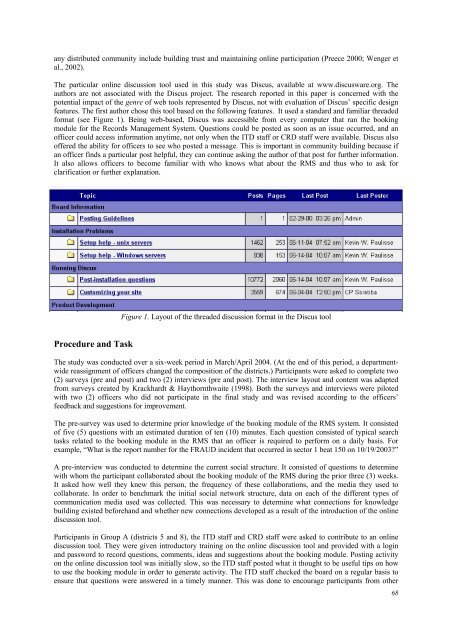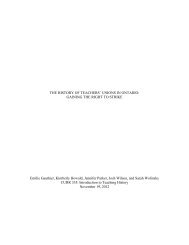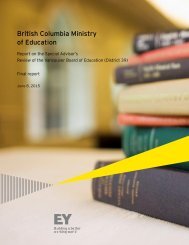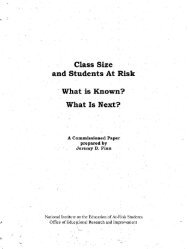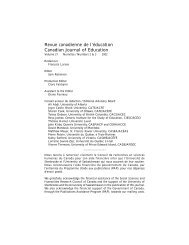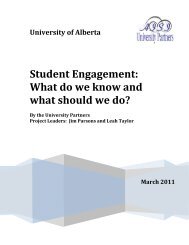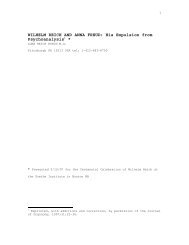October 2006 Volume 9 Number 4
October 2006 Volume 9 Number 4
October 2006 Volume 9 Number 4
Create successful ePaper yourself
Turn your PDF publications into a flip-book with our unique Google optimized e-Paper software.
any distributed community include building trust and maintaining online participation (Preece 2000; Wenger et<br />
al., 2002).<br />
The particular online discussion tool used in this study was Discus, available at www.discusware.org. The<br />
authors are not associated with the Discus project. The research reported in this paper is concerned with the<br />
potential impact of the genre of web tools represented by Discus, not with evaluation of Discus’ specific design<br />
features. The first author chose this tool based on the following features. It used a standard and familiar threaded<br />
format (see Figure 1). Being web-based, Discus was accessible from every computer that ran the booking<br />
module for the Records Management System. Questions could be posted as soon as an issue occurred, and an<br />
officer could access information anytime, not only when the ITD staff or CRD staff were available. Discus also<br />
offered the ability for officers to see who posted a message. This is important in community building because if<br />
an officer finds a particular post helpful, they can continue asking the author of that post for further information.<br />
It also allows officers to become familiar with who knows what about the RMS and thus who to ask for<br />
clarification or further explanation.<br />
Procedure and Task<br />
Figure 1. Layout of the threaded discussion format in the Discus tool<br />
The study was conducted over a six-week period in March/April 2004. (At the end of this period, a departmentwide<br />
reassignment of officers changed the composition of the districts.) Participants were asked to complete two<br />
(2) surveys (pre and post) and two (2) interviews (pre and post). The interview layout and content was adapted<br />
from surveys created by Krackhardt & Haythornthwaite (1998). Both the surveys and interviews were piloted<br />
with two (2) officers who did not participate in the final study and was revised according to the officers’<br />
feedback and suggestions for improvement.<br />
The pre-survey was used to determine prior knowledge of the booking module of the RMS system. It consisted<br />
of five (5) questions with an estimated duration of ten (10) minutes. Each question consisted of typical search<br />
tasks related to the booking module in the RMS that an officer is required to perform on a daily basis. For<br />
example, “What is the report number for the FRAUD incident that occurred in sector 1 beat 150 on 10/19/2003?”<br />
A pre-interview was conducted to determine the current social structure. It consisted of questions to determine<br />
with whom the participant collaborated about the booking module of the RMS during the prior three (3) weeks.<br />
It asked how well they knew this person, the frequency of these collaborations, and the media they used to<br />
collaborate. In order to benchmark the initial social network structure, data on each of the different types of<br />
communication media used was collected. This was necessary to determine what connections for knowledge<br />
building existed beforehand and whether new connections developed as a result of the introduction of the online<br />
discussion tool.<br />
Participants in Group A (districts 5 and 8), the ITD staff and CRD staff were asked to contribute to an online<br />
discussion tool. They were given introductory training on the online discussion tool and provided with a login<br />
and password to record questions, comments, ideas and suggestions about the booking module. Posting activity<br />
on the online discussion tool was initially slow, so the ITD staff posted what it thought to be useful tips on how<br />
to use the booking module in order to generate activity. The ITD staff checked the board on a regular basis to<br />
ensure that questions were answered in a timely manner. This was done to encourage participants from other<br />
68


